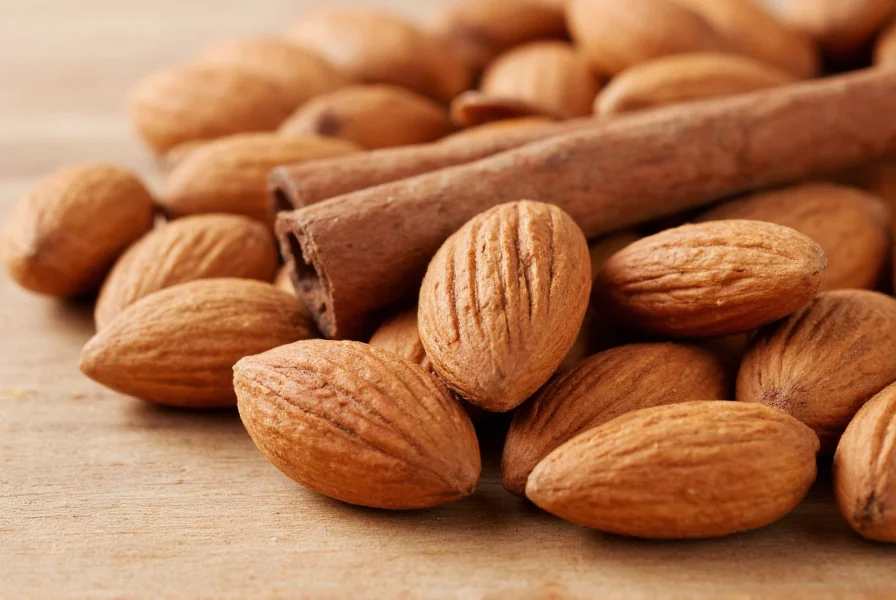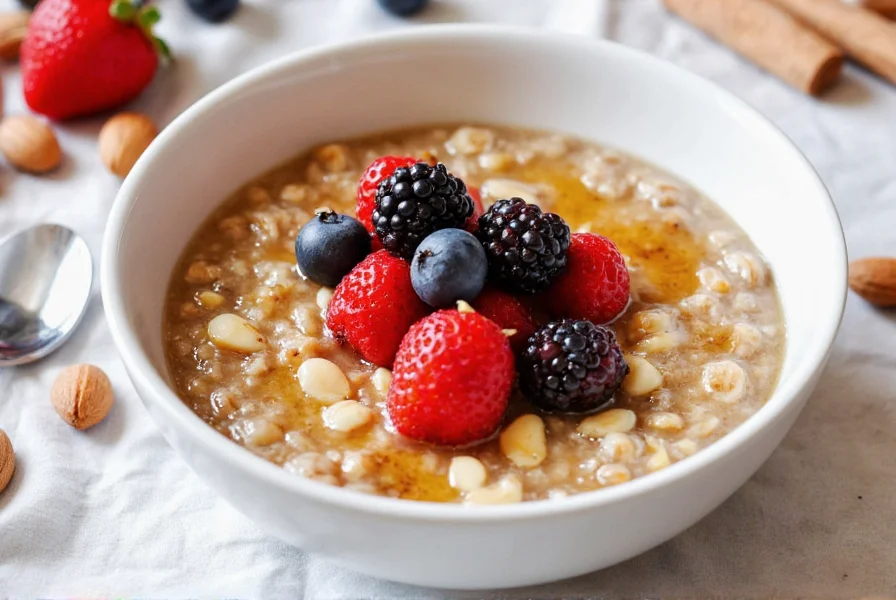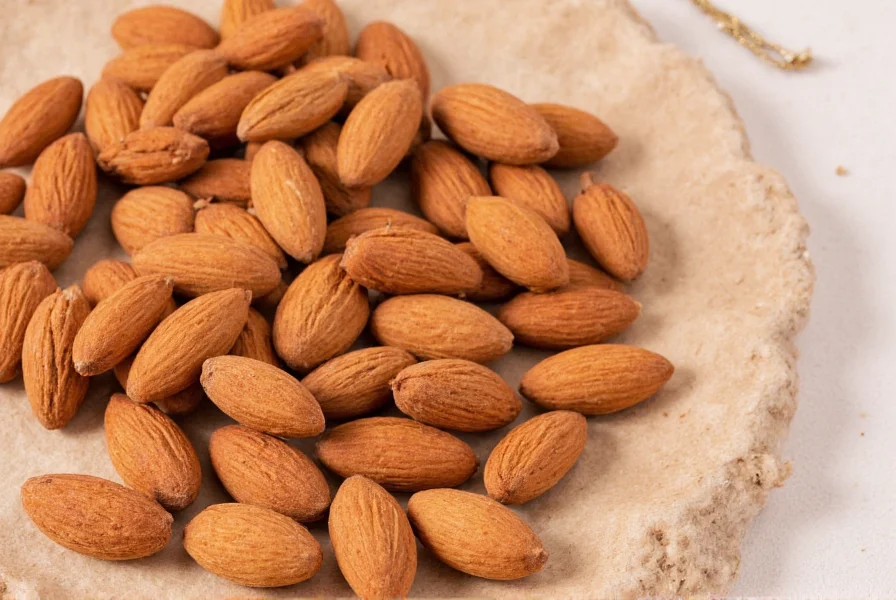When combined thoughtfully, almonds and cinnamon create a powerful nutritional pairing that delivers synergistic health advantages. This dynamic duo brings together the protein-rich, vitamin-packed profile of almonds with cinnamon's potent bioactive compounds, creating a combination that's greater than the sum of its parts. Understanding how these two ingredients work together can help you maximize their potential benefits for your daily wellness routine.
Nutritional Powerhouses: Individual Profiles
Almonds stand out as one of nature's most complete plant-based foods. A single ounce (about 23 almonds) provides 6 grams of plant-based protein, 3.5 grams of fiber, and significant amounts of vitamin E (37% of daily value), magnesium (20% DV), and healthy monounsaturated fats. These nutrient-dense nuts also contain calcium, potassium, and B vitamins that support multiple bodily functions.
Cinnamon, particularly the Ceylon variety, contains cinnamaldehyde as its primary active compound, responsible for many of its health-promoting properties. Just one teaspoon delivers manganese (16% DV), calcium (6% DV), and fiber, along with powerful polyphenols that function as antioxidants. Unlike many spices, cinnamon maintains its beneficial compounds even when heated, making it versatile for both raw and cooked applications.
| Nutrient | Almonds (1 oz) | Cinnamon (1 tsp) |
|---|---|---|
| Calories | 164 | 6 |
| Protein | 6g | 0.1g |
| Fiber | 3.5g | 1.5g |
| Vitamin E | 7.3mg (37% DV) | 0.03mg |
| Manganese | 0.3mg (13% DV) | 1.6mg (80% DV) |
Science-Backed Health Benefits of the Combination
Research indicates that combining almonds and cinnamon creates complementary effects that enhance their individual benefits. Multiple studies have examined how this pairing influences metabolic health. A 2020 review published in Nutrients highlighted that almonds' healthy fats and fiber work synergistically with cinnamon's bioactive compounds to improve insulin sensitivity. The monounsaturated fats in almonds help slow carbohydrate absorption, while cinnamon's compounds enhance insulin receptor function.
For cardiovascular health, this combination shows promise in managing multiple risk factors. Almonds contribute heart-healthy fats that improve cholesterol profiles, while cinnamon contains compounds that may help lower blood pressure. A clinical trial in the American Journal of Clinical Nutrition found that participants consuming both almonds and cinnamon daily showed greater improvements in LDL cholesterol and triglyceride levels compared to those consuming either alone.
The antioxidant synergy between these ingredients deserves special attention. Almonds provide vitamin E and flavonoids, while cinnamon offers potent polyphenols. Together, they create a broader spectrum of antioxidant protection that combats oxidative stress more effectively than either ingredient alone. This combined antioxidant effect may contribute to reduced inflammation throughout the body.

Practical Applications for Daily Wellness
Incorporating almonds and cinnamon into your daily routine requires minimal effort but delivers maximum benefit. For optimal blood sugar management, try pairing a small handful of almonds with a sprinkle of cinnamon on an apple or pear. This combination provides fiber from the fruit, healthy fats from the almonds, and cinnamon's blood sugar-regulating compounds.
When preparing almond milk at home, adding cinnamon during the blending process enhances both flavor and nutritional value. The healthy fats in almonds help increase absorption of cinnamon's fat-soluble compounds, making this combination particularly effective. For those managing weight, a morning smoothie with almond butter, cinnamon, and leafy greens creates a satisfying meal that stabilizes blood sugar throughout the morning.
Culinary applications extend beyond sweet preparations. Savory dishes benefit from this pairing too—try adding slivered almonds and a pinch of cinnamon to roasted carrots or sweet potatoes. The natural sweetness of these vegetables complements the warm spice notes while creating a nutritionally balanced side dish. For a simple snack, lightly toast almonds with a dusting of cinnamon and a pinch of sea salt.
Evidence-Based Considerations
While generally safe for most people, certain considerations apply when consuming almonds and cinnamon regularly. Those with tree nut allergies should avoid almonds entirely, while cinnamon sensitivity affects a small percentage of the population. Cassia cinnamon, the more common variety, contains coumarin, which in excessive amounts may affect liver function. Opting for Ceylon cinnamon ("true cinnamon") provides the benefits with minimal coumarin content.
Research suggests optimal daily amounts for maximum benefit without risk. For almonds, 1-2 ounces (23-46 nuts) daily provides significant nutritional benefits without excessive calorie intake. Regarding cinnamon, studies showing health benefits typically use 1-2 teaspoons of Ceylon cinnamon daily. Consuming these amounts as part of meals rather than on an empty stomach maximizes absorption and minimizes potential digestive discomfort.
Individuals taking blood sugar medications should monitor their levels carefully when adding significant amounts of cinnamon to their diet, as the combination may enhance medication effects. Similarly, those on blood thinners should consult their healthcare provider before consuming large amounts of cinnamon regularly due to potential interactions.

Maximizing the Benefits Through Proper Preparation
The way you prepare almonds and cinnamon affects their nutritional availability. Raw almonds retain all their natural enzymes and nutrients, but soaking them overnight can improve digestibility and nutrient absorption for some people. When combining with cinnamon, adding the spice after cooking preserves more of its volatile compounds.
For those seeking the maximum antioxidant benefit, pairing almonds and cinnamon with a source of vitamin C can enhance absorption of certain compounds. Try adding a squeeze of lemon juice to almond-cinnamon recipes or serving them with berries. The healthy fats in almonds also help absorb fat-soluble compounds from the cinnamon, creating a natural delivery system for maximum benefit.
Storage methods impact the longevity of these ingredients' benefits. Keep almonds in an airtight container in the refrigerator to prevent rancidity of their healthy fats. Cinnamon maintains its potency best when stored in a cool, dark place in a glass container. Proper storage ensures you receive the full nutritional value each time you use them.
Conclusion: A Simple Addition with Significant Impact
The combination of almonds and cinnamon represents a straightforward yet powerful addition to a health-conscious diet. Their complementary nutritional profiles create synergistic effects that enhance blood sugar regulation, antioxidant protection, and cardiovascular support. By understanding the science behind this pairing and incorporating it thoughtfully into daily meals, you can harness these natural ingredients to support multiple aspects of wellness without drastic dietary changes.
Frequently Asked Questions
Can almonds and cinnamon help with blood sugar control?
Yes, research shows that combining almonds and cinnamon may improve blood sugar regulation. Almonds provide healthy fats and fiber that slow carbohydrate absorption, while cinnamon contains compounds that enhance insulin sensitivity. A study in the Journal of the American College of Nutrition found that consuming 1-2 ounces of almonds with 1 teaspoon of cinnamon daily helped improve post-meal blood sugar levels in individuals with prediabetes.
What's the best type of cinnamon to use with almonds for health benefits?
Ceylon cinnamon (often called 'true cinnamon') is generally preferred over Cassia cinnamon for regular consumption. While both varieties offer health benefits, Ceylon contains significantly less coumarin, a compound that may cause liver issues in large amounts. Ceylon cinnamon has a more delicate flavor that complements almonds beautifully while providing the maximum health benefits with minimal risk.
How much almonds and cinnamon should I consume daily for health benefits?
Research suggests consuming 1-2 ounces (23-46) of almonds and 1-2 teaspoons of cinnamon daily to achieve measurable health benefits. This amount provides significant nutritional value without excessive calorie intake. For blood sugar management, pairing a small handful of almonds (about 1 ounce) with ½-1 teaspoon of cinnamon as part of a meal shows the most consistent results in clinical studies.
Are there any risks to combining almonds and cinnamon regularly?
For most people, combining almonds and cinnamon is safe when consumed in typical dietary amounts. However, those with tree nut allergies should avoid almonds entirely. Individuals taking blood sugar medications should monitor their levels carefully as the combination may enhance medication effects. Those on blood thinners should consult their healthcare provider before consuming large amounts of cinnamon regularly due to potential interactions.











 浙公网安备
33010002000092号
浙公网安备
33010002000092号 浙B2-20120091-4
浙B2-20120091-4